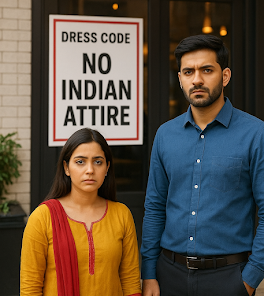
A couple in Delhi was allegedly denied entry into a restaurant as the women was wearing a Salwar-Kurta-an Indian Attire. This incident took place at a restaurant near Pitampura Metro station. This incident was shared online by the couple which went viral.
The social reaction to this incident of a women denied entry into a restaurant as she was attired in a traditional Salwar-Kurta has been one of widespread outrage and debate.
Outrage and Accusation of a Colonial Mindset: – The most common reaction was anger and frustration. People condemned the restaurant’s alleged policy calling it an insult to the Indian Culture. It primarily reflects a colonial hangover where western attire is viewed as modern and acceptable, while traditional Indian clothing is outdated or even inappropriate within the Jurisdiction of India. It was further alleged that people in ‘skimpier’ western clothes were allowed there. This fueled the sentiment of the people at large.
Demand for Action: – This led to a huge public outcry thereby leading to quick and prompt action by the Delhi Chief Minister and other Government Officials who ordered a quick investigation calling the incident ‘unacceptable.’ This in turn led to the restaurant’s apology and a change in policy itself.
Private vs Public Spaces: – While majority condemned such an action by the restaurant while small but a vocal group defended the right of the establishment to have a dress code. This perspective raises a very pertinent question where the line is drawn between a private establishment’s right to set rules vs cultural and social discrimination.
Public Shaming and Accountability: – This incident is a very clear example of the power of social media which was built due to immense public pressure, it held that the restaurant was accountable for such an act. The apology of the owner of the restaurant, the rescinding of the dress code and special discount offer for women in Indian attire where all the direct responses to this backlash. The swift and decisive public and political reaction demonstrates that regardless of legal ambiguity such perceived discrimination against Indian culture will not be tolerated.
Constitutional Rights: – The Indian Constitution under Article 15(2) prohibits discrimination, however, dress is not explicitly mentioned as a protected category.
Right to Refuse Service vs Discrimination: – Private establishments, like restaurants, generally have the right to set their own rules, including dress codes and to refuse service for reasons that are discriminatory. This is where the ambiguity lies. The question occurs whether a dress code that disallows traditional Indian attire really constitutes discrimination on grounds of culture or national origin, even if it is not explicitly stated.
Judicial Precedents: –
Ø Madras High Court (2014) – A Judge and a Senior Advocate were denied entry to a Cricket Club for wearing traditional Dhotis. This incident led to the passing of (REMOVAL OF RESTRICTION ON DRESS) 2014 in Tamil Nadu which specifically prohibits dress code restrictions on traditional Indian attire. This law, however is specific to Tamil Nadu.
Ø Delhi Court Rulings: – A Delhi Court in a separate ruling has spelled that wearing “small clothes” is not a crime unless it causes public annoyance, upholding Personal Freedom and Expression. This suggests a general inclination of the Judiciary to protect personal choices in attire, but again it is not a direct precedent for private establishment’s dress code.
Conclusion: – While there is no specific Central Law that prohibits a private establishment from having a dress code, denying entry based on traditional Indian attire could be a challenge as a form of cultural or nationality-based discrimination, which is against the spirit of the Constitutional.
The lack of clear legal framework means that the legal standing would depend on the specific facts of the case and would likely be subject to Judicial interpretation. In practice, the Social and Political backlash that followed the incidents proved to be the most effective form of redressal.
Advocate Mamta Singh Shukla
Supreme Court of India
Mob. No. – 9560044035

